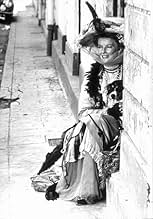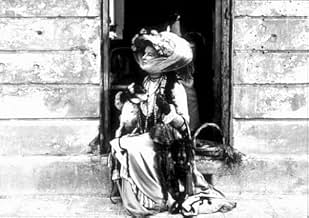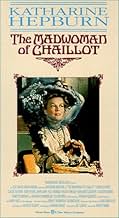CALIFICACIÓN DE IMDb
5.9/10
1.3 k
TU CALIFICACIÓN
Una condesa desafiante, creyendo que el bien debe vencer al mal, decide enfrentar a los corruptos y poderosos gobernantes de París.Una condesa desafiante, creyendo que el bien debe vencer al mal, decide enfrentar a los corruptos y poderosos gobernantes de París.Una condesa desafiante, creyendo que el bien debe vencer al mal, decide enfrentar a los corruptos y poderosos gobernantes de París.
- Dirección
- Guionistas
- Elenco
- Dirección
- Guionistas
- Todo el elenco y el equipo
- Producción, taquilla y más en IMDbPro
Opiniones destacadas
You have to see this movie twice. The first time I saw it, I was disappointed. With such a fabulous cast you would expect something more than talk-politics-symbolism, but the second time I watched it I discovered I really loved it. Its theme is timeless and the film is of course, full of great performances.
The wonderful Katharine Hepburn carries the burden of this entire fiasco, and under any other actress's supervision, this would simply not have survived. It is not at all an easy thing to make this whole wacky plot stick together, and somehow she does it. If she has trouble at sometimes, it is certainly not her fault. The part is incredibly challenging, even for one of Hollywood's most brilliant actresses. (I'd like to see Meryl Streep try to tackle this one!) Brynnor, Gavin, Kaye and the rest all do good jobs, but the spectator can't help but ask, what are they doing in this movie? Richard Chamberlain is delightful and he and Katharine Hepburn really are the driving forces.
Yes, the themes are overdone, the film is talky, a little confusing, and even boring at times - but it still works and is well worth watching.
The wonderful Katharine Hepburn carries the burden of this entire fiasco, and under any other actress's supervision, this would simply not have survived. It is not at all an easy thing to make this whole wacky plot stick together, and somehow she does it. If she has trouble at sometimes, it is certainly not her fault. The part is incredibly challenging, even for one of Hollywood's most brilliant actresses. (I'd like to see Meryl Streep try to tackle this one!) Brynnor, Gavin, Kaye and the rest all do good jobs, but the spectator can't help but ask, what are they doing in this movie? Richard Chamberlain is delightful and he and Katharine Hepburn really are the driving forces.
Yes, the themes are overdone, the film is talky, a little confusing, and even boring at times - but it still works and is well worth watching.
A wonderful fable I happened to stumble across. The inimitable Katharine Hepburn as the title character conspires with other eccentrics to save Paris. Warm, funny, delightfully non-sequitur and deeply poignant, this film has messages about love, greed, happiness, fear, hope, dreams. . .life. Excellent performances by all, including some wonderful dramatic acting by Danny Kaye. I highly recommend this movie.
A fable of human and societal archetypes spanning the generations. But what wonderful surprises from Danny Kaye as the Ragpicker. His soliloquies during the trial demolish all the stereotypes of what he was capable of as an actor. Those moments, alone, are worth the fare. Kathryn Hepburn puts in a typically professional performance in a role she enjoyed. Donald Pleasance is marvelously malevolent as the Prospector. Yul Brynner is terrific in an atypical role - probably his best since "Invitation to a Gunfighter". If the story suffers from anything, it is overreach - too many characters of outlooks that are too similar wasted on name actors. John Gavin puts in a strange performance that could have been better filled by dozens of other actors.
Question: In 1943 what movie starred Katherine Hepburn, Katherine Cornell, and Harpo Marx?
ANSWER: STAGE DOOR CANTEEN
Question: In 1969 what movie starred Katherine Hepburn, Dame Edith Evans, and Danny Kaye?
ANSWER: THE MADWOMAN OF CHAILLOT
Odd that Kate Hepburn should pop up in two unfair trivia questions, but it does happen. Actors do run into each other in all kinds of films, both good and bad, memorable and forgettable, and regular or short film (look at a comic short called THE STOLEN JOOLES which has most of the stars of Hollywood in the 1930s in it).
STAGE DOOR CANTEEN was done for patriotic morale boosting for our soldiers, and it celebrated the canteens used to entertain our men on furlough. So the making of that film had a reason that transcends it's current obscurity. I might add, as it is the only major movie that stage star Katherine Cornell popped up in for just a few minutes, it is worth it as a time capsule as such.
But THE MADWOMAN OF CHAILLOT was based on a Giraudoux play about modern society endangered by the forces of power and greed. It is about the discovery that the city of light, Paris, is reposing on a huge, untapped oil field, and that various power figures without any soul (Yul Brynner, Charles Boyer, Paul Henried, Oscar Holmolka, Donald Pleasance) may be able to empty the city of it's neighborhoods, it's citizens, it's life and light, and replace it with derricks. Giraudoux made sure that the villains represent everything that he suspects. Brynner is the ultimate ruthless billionaire (he is upset when a waiter accidentally spills water on him). Boyer is a stock broker. Henried is a General. Homolka is the French head of the Communist Party (Giraudoux has no illusions about what a political label means - there are power mad people in all political parties). Pleasance is a prospector for oil. There is also John Gavin as a right wing religious demagogue.
Opposed to these villains are Kate Hepburn (the leading local social figure from the past - called "the madwoman of Chaillot") and her friends Giulietta Massina, Margaret Leighton, and Edith Evans (who is still trying to campaign in 1969 for Mr. Wilson's League of Nations). Also aiding Hepburn are the "rag picker" (Danny Kaye - in the best dramatic performance in a major motion picture in his career - also his only Oscar nomination), Richard Chamberlain, Gordon Heath, and Nanette Newman. Although Hepburn, Massina, Leighton, and Evans have social position, none have the political clout of the villains. So when they are made aware of the threat to their beloved Paris (and by extension western culture and morality) they hold a trial (in absentia) of the villains, and find these villains have to die.
This film is better for the brief vignettes of it's stars than for the total impact. Brynner's malevolent, general ruthlessness is one of his best acting jobs. So is Henried's almost comical criminal activity: he confesses to having arranged the murder of four promising young aides of his, because he suspected one of them (but not knowing which) of sleeping with his wife - it turned out his wife had been faithful after all (Brynner, Boyer, Homolka, and Gavin congratulate him on his luck!). Kaye has several great set pieces - a rag picker he wraps eloquent about the great, glory days of garbage in the past where each neighborhood's garbage had a special character all it's own (as opposed to the garbage of the modern homogenized neighborhoods of Paris, that those villains forced on the citizens). He is superb in the scene where he is the "defense" counsel for Brynner and his group - demoniacally showing what these people are really like while "defending" them. All those comic, scatterbrained, sequences in his movies built up to these scenes of poetry and passion.
Hepburn, of course, was great - that last sequence where she mistakes Chamberlain for the lost love of her youth, and mournfully laments his loss, is a highpoint in her career. She rarely had so poetic a scene of tragic delicacy.
But the story, oddly enough, for all we may approve of the hatred shown for the powerful who use and discard us, is not fully acceptable. Henried's general is too stupid (he almost launches a missile attack on Russia while talking to Hepburn). Brynner is so impossibly arrogant that a consortium of his fellow billionaires would probably ruin him to shut him up. But the acting is still so good that it one can forget these minor problems. Any film where Donald Pleasance uses his prominent proboscis by putting it into a drinking glass to smell for oil cannot be all bad. So I'll give it a "6", if not higher.
ANSWER: STAGE DOOR CANTEEN
Question: In 1969 what movie starred Katherine Hepburn, Dame Edith Evans, and Danny Kaye?
ANSWER: THE MADWOMAN OF CHAILLOT
Odd that Kate Hepburn should pop up in two unfair trivia questions, but it does happen. Actors do run into each other in all kinds of films, both good and bad, memorable and forgettable, and regular or short film (look at a comic short called THE STOLEN JOOLES which has most of the stars of Hollywood in the 1930s in it).
STAGE DOOR CANTEEN was done for patriotic morale boosting for our soldiers, and it celebrated the canteens used to entertain our men on furlough. So the making of that film had a reason that transcends it's current obscurity. I might add, as it is the only major movie that stage star Katherine Cornell popped up in for just a few minutes, it is worth it as a time capsule as such.
But THE MADWOMAN OF CHAILLOT was based on a Giraudoux play about modern society endangered by the forces of power and greed. It is about the discovery that the city of light, Paris, is reposing on a huge, untapped oil field, and that various power figures without any soul (Yul Brynner, Charles Boyer, Paul Henried, Oscar Holmolka, Donald Pleasance) may be able to empty the city of it's neighborhoods, it's citizens, it's life and light, and replace it with derricks. Giraudoux made sure that the villains represent everything that he suspects. Brynner is the ultimate ruthless billionaire (he is upset when a waiter accidentally spills water on him). Boyer is a stock broker. Henried is a General. Homolka is the French head of the Communist Party (Giraudoux has no illusions about what a political label means - there are power mad people in all political parties). Pleasance is a prospector for oil. There is also John Gavin as a right wing religious demagogue.
Opposed to these villains are Kate Hepburn (the leading local social figure from the past - called "the madwoman of Chaillot") and her friends Giulietta Massina, Margaret Leighton, and Edith Evans (who is still trying to campaign in 1969 for Mr. Wilson's League of Nations). Also aiding Hepburn are the "rag picker" (Danny Kaye - in the best dramatic performance in a major motion picture in his career - also his only Oscar nomination), Richard Chamberlain, Gordon Heath, and Nanette Newman. Although Hepburn, Massina, Leighton, and Evans have social position, none have the political clout of the villains. So when they are made aware of the threat to their beloved Paris (and by extension western culture and morality) they hold a trial (in absentia) of the villains, and find these villains have to die.
This film is better for the brief vignettes of it's stars than for the total impact. Brynner's malevolent, general ruthlessness is one of his best acting jobs. So is Henried's almost comical criminal activity: he confesses to having arranged the murder of four promising young aides of his, because he suspected one of them (but not knowing which) of sleeping with his wife - it turned out his wife had been faithful after all (Brynner, Boyer, Homolka, and Gavin congratulate him on his luck!). Kaye has several great set pieces - a rag picker he wraps eloquent about the great, glory days of garbage in the past where each neighborhood's garbage had a special character all it's own (as opposed to the garbage of the modern homogenized neighborhoods of Paris, that those villains forced on the citizens). He is superb in the scene where he is the "defense" counsel for Brynner and his group - demoniacally showing what these people are really like while "defending" them. All those comic, scatterbrained, sequences in his movies built up to these scenes of poetry and passion.
Hepburn, of course, was great - that last sequence where she mistakes Chamberlain for the lost love of her youth, and mournfully laments his loss, is a highpoint in her career. She rarely had so poetic a scene of tragic delicacy.
But the story, oddly enough, for all we may approve of the hatred shown for the powerful who use and discard us, is not fully acceptable. Henried's general is too stupid (he almost launches a missile attack on Russia while talking to Hepburn). Brynner is so impossibly arrogant that a consortium of his fellow billionaires would probably ruin him to shut him up. But the acting is still so good that it one can forget these minor problems. Any film where Donald Pleasance uses his prominent proboscis by putting it into a drinking glass to smell for oil cannot be all bad. So I'll give it a "6", if not higher.
There is a segment within a scene almost ending the first act of "The Madwoman of Chaillot", that suggest the direction the story is going to take. While the fanciful old countess Aurelia (Katharine Hepburn) explains young Roderick (Richard Chamberlain) the joys of being alive, the visuals turn to a slightly hazy retrospection of her love life, in which Roderick is seen as her mustachioed lover Alphonse, and the waitress Irma (Nanette Newman), with whom Roderick will fall in love, is seen as Aurelia when she was younger. All this theatricality is followed by a brief scene that ends the act, in which Irma delivers a soliloquy about her growing love for Roderick. Then after a fascinating first hour in which the plot is so startlingly current, as act two starts, we enter the world of filmed theater and the movie hardly recovers. If "The Madwoman of Chaillot" is remembered with affection after it ends, it is because of its first part, in which a rich and ruthless self-made man who leads a group that includes a general, a Catholic priest, a broker and a communist commissar, joins a similarly cruel prospector whose plan is the creation of an enterprise to dig up oil in the middle of historical Paris. The prospector has sent his nephew Roderick to put a bomb in the Palais de Chaillot to kill a public officer who denies him permission to begin his oil operation. But when Roderick fails and the police believe he is going to commit suicide, he meets countess Aurelia, who hears about the plan and decides to solve it by herself. Then action slows down, everything is done in interiors and the situation is resolved in strange ways -- first with a metaphorical trial which is pure stage material, and then with a certainly weird "execution" of the villains. By 1969 director Bryan Forbes was riding the crest of his own international film wave and had a great cast, in which even John Gavin delivered a fine funny performance of an evil priest. Masina is a delight, Evans is wonderful, and Homolka, Leighton, Henreid, Boyer and Dauphin are as good as all the supporting players, while Hepburn tries hard with her teary eyes... I could not help thinking what this would have been with a French actress in the lead.
¿Sabías que…?
- TriviaJohn Huston was originally set to direct this film, but left the production some 17 days before shooting was due to begin. Bryan Forbes agreed to take over in order to have the experience of directing Katharine Hepburn, who became a close friend; he also insisted on hiring Ray Simm, a regular collaborator, as the set designer, and several last-minute alterations were made to already-built settings. Forbes also gave Michael J. Lewis his first job as a film composer.
- Citas
Opening Title Card: This is a story of the triumph of good over evil. Obviously it is a fantasy.
- ConexionesFeatured in Cinema: Alguns Cortes - Censura III (2015)
- Bandas sonorasThe Lonely Ones
Music by Michael J. Lewis
Lyrics by Gil King
Performed by Gordon Heath (uncredited)
[The Folksinger's song]
Selecciones populares
Inicia sesión para calificar y agrega a la lista de videos para obtener recomendaciones personalizadas
- How long is The Madwoman of Chaillot?Con tecnología de Alexa
Detalles
- Fecha de lanzamiento
- País de origen
- Idiomas
- También se conoce como
- The Madwoman of Chaillot
- Locaciones de filmación
- Productora
- Ver más créditos de la compañía en IMDbPro
- Tiempo de ejecución2 horas 12 minutos
- Mezcla de sonido
- Relación de aspecto
- 1.85 : 1
Contribuir a esta página
Sugiere una edición o agrega el contenido que falta

Principales brechas de datos
By what name was La Loca de Chaillot (1969) officially released in India in English?
Responda




































